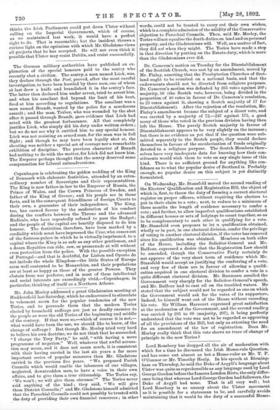Copenhagen is celebrating the golden wedding of the King of
Denmark with elaborate festivities, attended by an extra- ordinary number of Sovereigns and their representatives. The King is now father-in-law to the Emperor of Russia, the Prince of Wales, and the Crown Princess of Sweden, and father of the King of Greece; and his people see in those facts, and in the consequent friendliness of foreign Courts to their own, a guarantee of their independence. The King, too, has earned favour by the moderation of his conduct during the conflicts between the Throne and the advanced Radicals, who have repeatedly refused to pass the Budget; and the people of the capital are heartily disposed to do him honour. The festivities, therefore, have been marked by a cordiality which must have impressed the Czar,who comes out of the fortress-palace in which he is virtually imprisoned, to a capital where the King is as safe as any other gentleman, and a dozen Royalties can ride, row, or promenade at will without even protection from the police. With the possible exception of Portugal—and that is doubtful, for Lisbon and Oporto do not include the whole Kingdom—the little States of Europe seem well contented to be Monarchies, and their populations are at least as happy as those of the greater Powers. They abstain from war perforce, and in most of them intellectual and social interests are exceedingly vivid,—Copenhagen, in particular, thinking of itself as a Northern Athens.






































 Previous page
Previous page